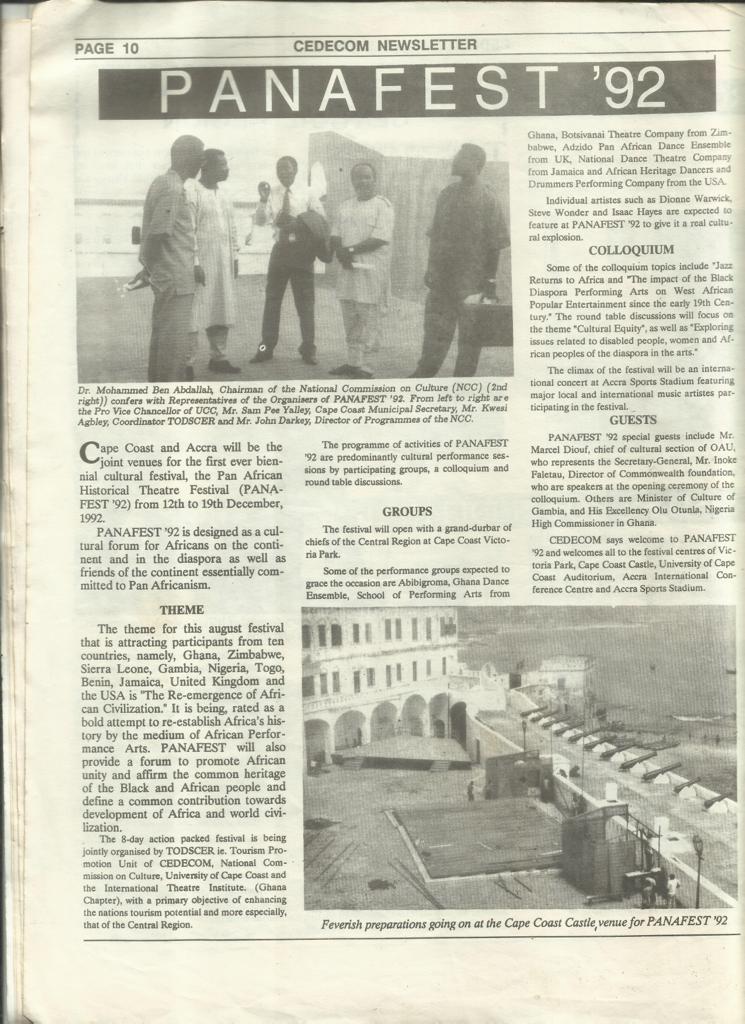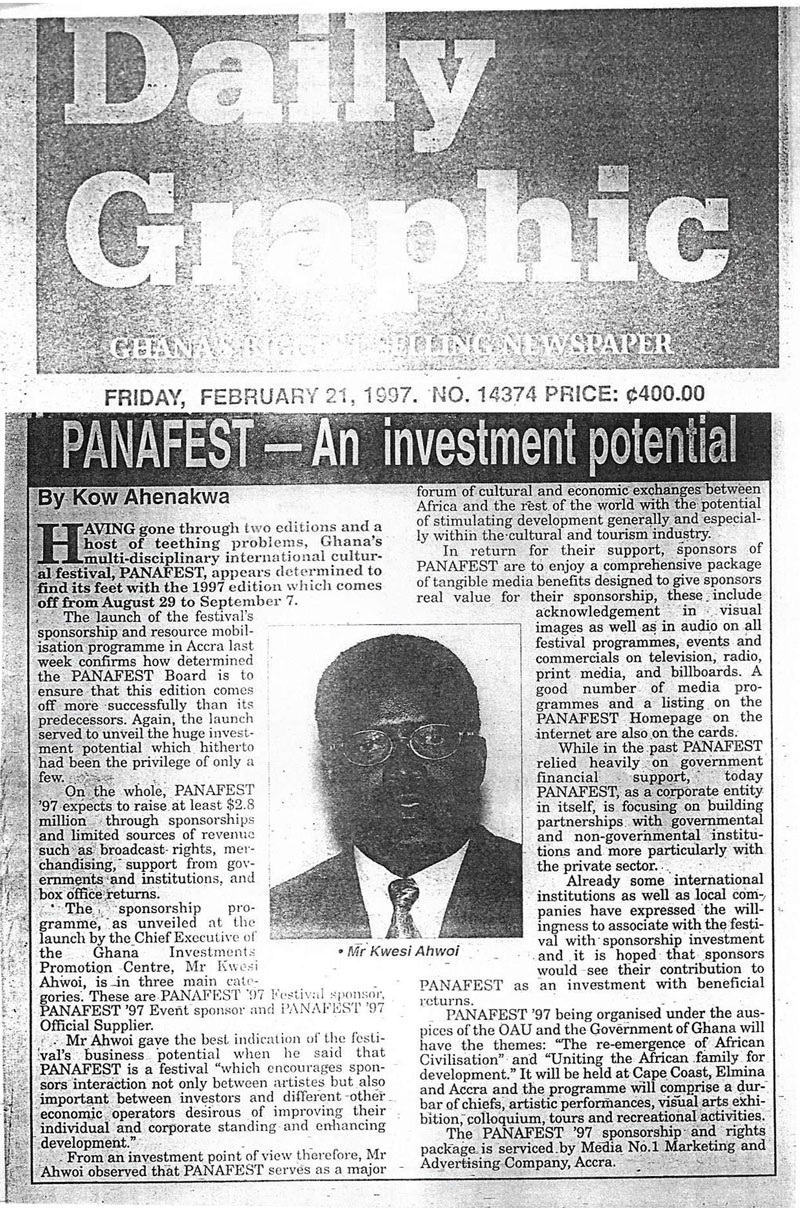HISTORY OF PANAFEST
The PANAFEST Festival was inspired by and takes its source from a paper written in 1980 entitled “Proposal for a Historical Drama Festival in Cape Coast” by Dr. Mrs. Efua Sutherland, who was a distinguished Ghanaian Dramatist and Pan-Africanist. In 1991 the idea gained root and took shape in an expanded form as the Pan-African Historical Theater Festival (PANAFEST).
Since its inception in 1992, PANAFEST has become a movement after 14 editions over the past 30 years (1992-2022) to not just Ghana’s cultural heritage tourism industry and also to people of African Descent throughout Africa and its diaspora, especially the Americas, with the shared historical past and reconciling the future through Arts and Culture as well as workshops, seminars, and specialized programing.
In October of 1992, PANAFEST was officially launched and in December of the same year, the national phase of the festival was held in Cape Coast, Ghana after a series of activities which included a national playwriting competition, organized seminars and workshops on Pan-Africanism across the country.
The first Pan-African Historical Theater Festival was held in Cape Coast, Elmina and Accra, Ghana from the 12th to the 19th December, 1992 under the theme “The Re-emergence of African Civilization”. PANAFEST 1992 was officially opened by Flt. Lt. J.J Rawlings, President of Ghana. In his welcome address he indicated that the festival marked the beginning of a festival movement with its “great source of cultural enrichment for all Africans at home and abroad.”
Here are some of the personalities and a few of the highlights that show the diversity and broad scope of PANAFEST contribution as a showcase for literature and the performing arts
1992 provided a glimpse of what was to come. Drawing on the rhythms of his native Ghana, drummer Thomas Segkura composed the theme music for PANAFEST 1992, using “sisaala” rhythms that expressed familiar musical narratives of victory in battle and honour to royal kings and chiefs. The internationally acclaimed “Pan-African Orchestra” shared the limelight with famous performers such as Germane Jackson, Yellow Man and “Public Enemy”.
The 1994 edition of PANAFEST adopted the sub-theme of “Uniting the African Family for Development” and witnessed the participation of over 4,000 international participants from 32 countries. Celebrities such as Dionne Warrick and Rita Marley graced the PANAFEST with their presence.
The world-renowned musician, Stevie Wonder was the leading artist at the 1994 festival. Stevie Wonder, who maintains a home in Ghana, was co-chairman of PANAFEST ’94.
When he inaugurated the Festival in Accra, he said, “We must take anything we have and everything we can offer, to make for a united Africa. Even though Africans are a diversified people with different languages and live in different places, Africans are originally one people and must not allow differences to affect their unification.”
Fulbright scholar Francis Kofi, former master drummer of the Ghana Dance Ensemble, is an emerging star in the world of African music and dance. In 1994 he debuted his opera music collage “Chains” at PANAFEST. Drawing from his knowledge of music, dance and spiritual traditions, Francis created a thought-evoking performance with the collaboration of New York based artist Andruid Kerne, fusing drum language to an experimental form of percussive poetry.
“Chains” examines the legacy of slavery using the coded messages of drums. The drum language calls for the ancestors’ support and speaks with proverbs in order to transmit a message with urgency.
In keeping with its tradition of showcasing the literary arts, PANAFEST ’94 invited Ms. NourbeSe Philip who is a lawyer, poet and writer. Born in Tobago, she now makes her home in Toronto Canada. The experiences of Black women and girls are foremost in NourbeSe’s works, as are issues of belonging, language, place and location.
In her own words, “For the many like me, black and female, it is imperative that our writing begin to recreate our histories and our myths, as well as integrate that most painful of experiences – loss of our history and our word. Reacquisition of power to create in one’s own image is vital to this process; it reaffirms for us that which we have always known, even in those darkest of times which are still with us – when everything conspired to prove otherwise – that we belong most certainly to the race of humans.”
The PANAFEST Colloquium was one of the jewels of the festival that attracted scholars of international renown from Africa, the Americas and Europe.
Following a 3-year hiatus, PANAFEST returned in 1997, consolidating venues in Accra and Cape Coast and extending its reach to other parts of Ghana. New forms of expression were added. 1997 saw the participation of such powerhouses as James Cannings – international recording artist and businessman, accomplished guitarist, keyboardist, composer, arranger, songwriter, producer and studio engineer. Born in Guyana, Cannings is known worldwide for his volunteer work at hospitals, nursing homes, schools, colleges, libraries, and international festivals where he regularly shares his reggae / world beat renditions. One of the headliners at PANAFEST 1997, he returned to Ghana to perform again at both 1999 and 2001 PANAFEST.
Mac Tontoh and his group “Kete Warriors” received accolades for their performances at PANAFEST in Ghana in both 1997 and 1999, at the 1998 National Festival of Arts and Culture in Bolgatanga, and at the 2000 Emancipation Day commemoration at Cape Coast - attended by Africans from all corners of the Diaspora, including delegations from the Americas, the Caribbean and Europe.
The new fusion of jazz and traditional Ashanti rhythms which emerged from this group confirmed Mac’s status at home as a truly vital force in contemporary Ghanaian music.
On hand to capture the sounds of PANAFEST ’97, Femi Lasode hails from Abeokuta, Nigeria. He is well-known as the music director behind the production company “Afrika ‘n Vogue” which has produced a number of successful musical works including Afrobeat Sketches 1996 and Afrikan Rythms 1998 – a musical project featuring such stars as King Sunny Ade, Sunny Neji, Francis Goldman, Yinka Davis, Alariwo of Africa, Peterson Agu, Prince Allam Bloo, and Princess Cheena Aboh. His studio took an active part in preserving the memories of PANAFEST ’97.

